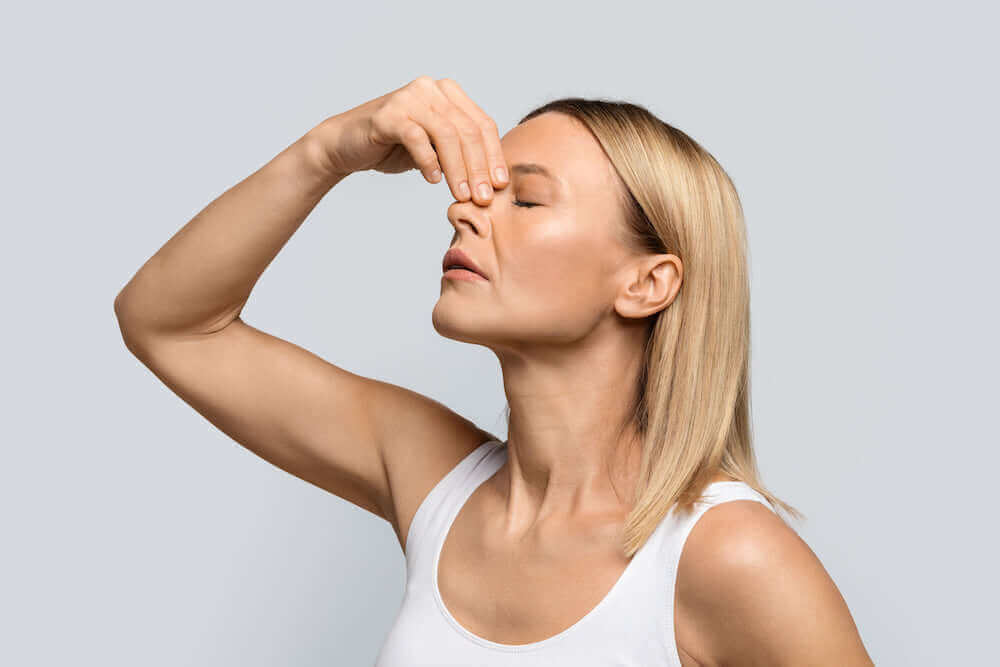There are several factors that can cause a blocked nose at night. So it's important to be aware of them, to maximize your chances of avoiding this problem in the future.
First of all, it's important to know that the type of obstruction, whether unilateral or bilateral, can give a first clue as to its causes. Unilateral obstructions unilateral obstructions can be caused by deviations in the nasal septum bilateral obstructions are mainly caused by damage to the nasal mucosa.
To go into more detail, here are the main causes of a blocked nose at night:
- Skeletal anomalies such as deviations of the nasal septum.
- Air that is too dry can also cause this type of problem type of problem.
- Mucosal damage may be inflammatory or infectious. These include rhinitis and rhinosinusitis.
- Tumors, which can be benign or malignant.

What are the remedies for a blocked nose at night?
There are many ways to avoid a blocked or congested nose, or at least to reduce the extent of it. Here are the remedies that can help you solve this problem:
- Homeopathy can be very effective against a blocked nostril. For example, you can take Nux vomica 9CH granules if you have a runny nose during the day and blocked sinuses at night, or Sambucus nigra 9CH granules if your nose is rather dry and you sniffle.
- Water is the most accessible natural remedy for nasal congestion, and can be used in a variety of ways. First of all, it's important to drink plenty of it, as it helps to unclog your nose if you have a permanently blocked or completely blocked nose. Next, salt water in the nose can be very beneficial, and can be found in the form of sprays in pharmacies. Hot water can also provide some relief, whether by placing compresses on your nose or simply taking a good shower.

- Lemon, mixed with water and applied in the form of drops to your nose, can also help unblock it overnight.
- There are also other grandmotherly remedies based on natural products that you can try, such as honey, ginger, tomato juice, essential oils, onion, pepper and certain spices.
Babies with blocked noses at night
A blocked nose in children and babies in particular, is quite common. In most cases, it's a nasal congestion linked to a cold or rhinopharyngitis, both of which are harmless illnesses. The main symptoms are runny nose or eyes, sneezing, fever and cough.
A cold that recurs frequently is usually due to an allergy such as hay fever, or to enlarged tonsils and adenoids.
The most effective way to remedy this problem and relieve the child is to apply a saline solution to each nostril. You can also humidify the air in his room before he goes to bed, to maximize his chances of being worry-free.
Although the common cold or runny nose is not very dangerous, it is necessary to see a doctor if symptoms worsen or do not diminish after several days. Particular care is needed when the baby is under 3 months of age, since up to this age, infants breathe only through the nose.
A blocked nose at night in pregnant women
Due to the onset of hormones, nasal congestion is particularly common in pregnant women. In particular, they can develop new allergies that cause these symptoms. It's important to talk to your doctor about this, as it can lead to eating and sleeping disorders.
However, it is possible to limit the risk of allergy by avoiding exposure to elements known to trigger allergic reactions, such as pollen, dust and mold.

If you're a pregnant woman suffering from nasal congestion, it's still possible to relieve this discomfort with the remedies we've outlined above. To help alleviate the symptoms, there are a few things you can do too, such as elevating your head when you sleep, or getting some regular exercise.
In the event of an allergic cause, you can take medication for relief, but make sure it's safe. These include antihistamines, decongestants and corticosteroids.
Stuffy nose at night and snoring
Snoring caused by nasal congestion is not to be taken lightly. First of all, it's a problem that can handicap your loved ones, but it can also be harmful to your health, since it can turn into a disease like sleep apnea.
There are various methods you can try to reduce snoring and breathing problems. First of all, you can try the solutions offered by pharmacies, such as strips, sprays or anti-snoring rings.
If that doesn't solve the problem, there are anti-snoring devices such as Back2Sleep a discreet orthosis inserted through the nose that helps maintain regular breathing throughout the night, thus preventing snoring, sleep apnea and repeated awakenings caused by nasal obstruction.








